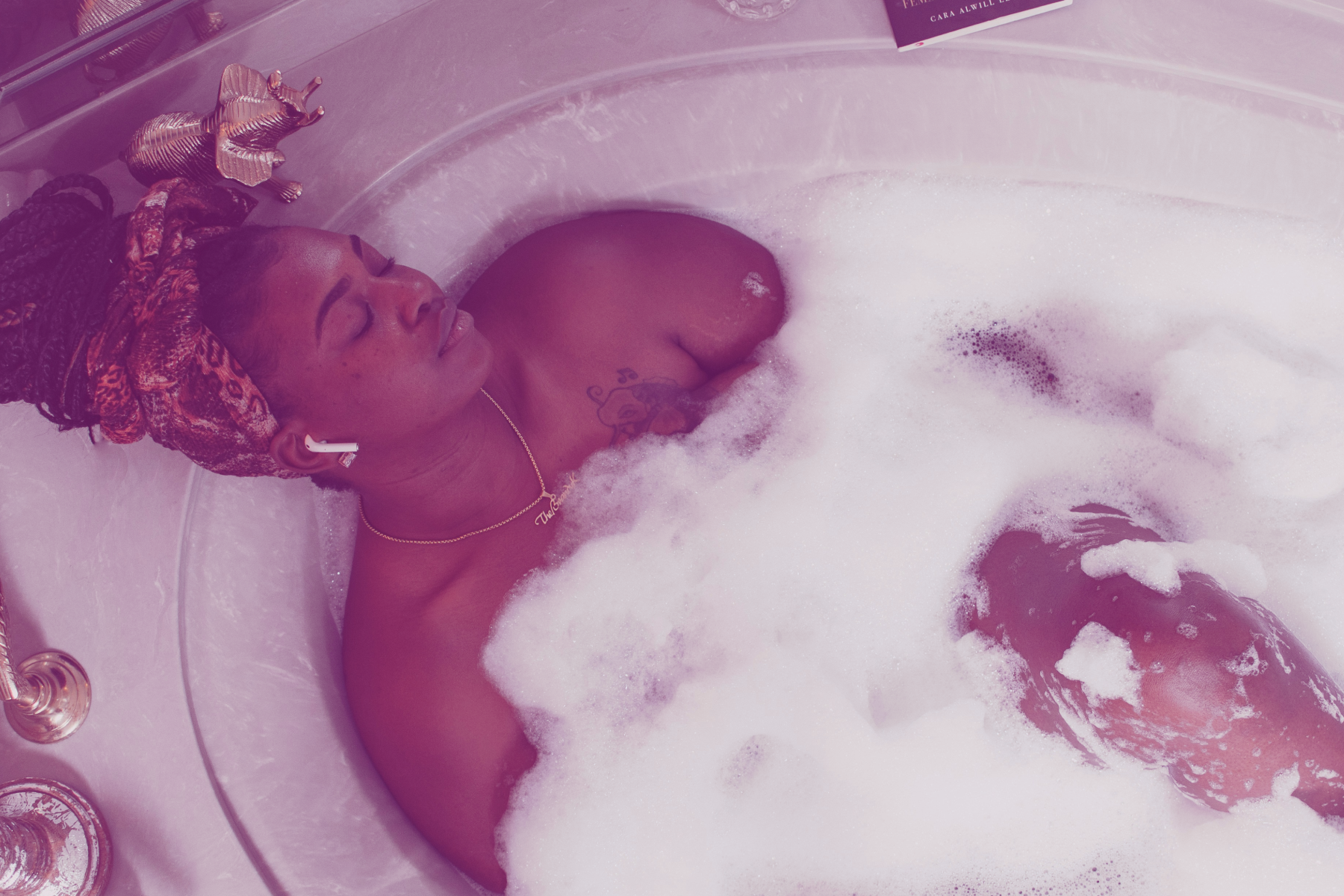Have you ever noticed how we talk about everything under the sun like career goals, fitness journeys, even our favorite pasta recipes, but when it comes to pleasure, suddenly everyone's playing the quiet game? 🤫
Let's break that silence today. Because honestly? Shame and pleasure shouldn't even be in the same sentence together.
Why We Feel Shame Around Self-Pleasure
First things first, that uncomfortable feeling you get when thinking about self-pleasure didn't just appear out of nowhere. It's been carefully constructed through years of:
- Those awkward "talks" (or lack thereof) from parents
- Religious messaging that labeled natural desires as "sinful"
- Media portrayals that either sensationalize or stigmatize sexuality
- Cultural norms that praise restraint while punishing exploration
According to Dr. Emily Nagoski, renowned sex educator and author, "Shame is not a sexually transmitted infection, it's a culturally transmitted emotional state" (Nagoski, 2021). And honestly? She's spot on. The shame we carry wasn't born with us, it was taught.
How Shame Shows Up in Your Body
When shame creeps in, your body knows before your mind can even process it. You might experience:
That flush creeping up your neck (hello, unwanted blush!) Shoulders hunching forward as if to hide A knot in your stomach that won't quit The sudden inability to make eye contact with, well, anyone
These physical responses aren't just uncomfortable, they're actively blocking your path to pleasure. Think about it: how can you possibly enjoy anything when your body is literally clenching up in distress?
The Magic of Self-Pleasure as Healing
Here's where things get interesting (and empowering!). Self-pleasure isn't just about the obvious physical benefits, it's literally rewiring your brain's relationship with your body.
When you engage in consensual pleasure with yourself, you're:
Creating New Neural Pathways
Each time you replace shame with enjoyment, you're literally creating new pathways in your brain. It's like redirecting a river that's been flowing the wrong way for years.
Reclaiming Bodily Autonomy
Your body doesn't belong to cultural expectations, past partners, or that weirdly judgmental voice in your head. It belongs to you. Full stop.
Sex therapist Dr. Laurie Mintz explains: "Self-pleasure is radical self-love in a world that profits from self-doubt" (Mintz, 2018). And isn't that the truth? In a world constantly telling us our bodies need fixing, enjoying your body exactly as it is becomes an act of revolution.
Practical Steps to Rewrite Your Sexual Narrative
Okay, so you're convinced that healing is possible, but how do you actually start? Let's break it down into manageable steps:
1. Identify Your Shame Triggers
Before you can rewrite your narrative, you need to know what you're working with. Take some quiet time to reflect:
- What specific messages about self-pleasure did you internalize growing up?
- When do feelings of shame typically arise?
-
Whose voice do you hear when shame speaks in your mind?
Understanding these patterns doesn't mean they're true, it just means you can recognize them when they show up uninvited.
2. Create a Pleasure-Positive Environment
Your environment shapes your experience in powerful ways. Before exploring self-pleasure as healing:
- Find a space where you feel safe and comfortable
- Ensure privacy (locks, schedule, whatever helps you relax)
- Remove distractions that pull you out of the moment
-
Consider elements that enhance comfort: soft lighting, cozy textures, pleasant scents
This isn't about Instagram-worthy aesthetic, it's about creating a container where shame isn't welcome.
3. Practice Mindful Touch
Healing through self-pleasure isn't about performance or reaching a specific goal. It's about reconnecting with your body through present, compassionate attention.
Start with non-sexual touch if that feels more comfortable. Simply placing a hand on your heart, feeling your breath rise and fall, can begin establishing trust with your body.
When you're ready to explore further, move slowly. Notice sensations without judgment. If shame arises (and it might!), acknowledge it without letting it take control: "I notice shame is here. I'm going to continue being gentle with myself."
4. Journal Your Journey
Writing creates powerful integration between experience and understanding. After exploring self-pleasure, take a few moments to note:
- Physical sensations you enjoyed
- Moments when shame tried to interrupt
- How you responded to those interruptions
-
What felt healing or liberating
This practice helps solidify new neural pathways and gives you concrete evidence of your progress.
The Science Behind Pleasure and Healing
Let's get a tiny bit nerdy for a moment (in the sexiest way possible, of course 😉).
When you experience pleasure, your body releases a cocktail of feel-good hormones:
- Oxytocin, the "bonding hormone" that increases feelings of trust and connection, yes, even with yourself!
- Endorphins that reduce stress and create natural euphoria
-
Dopamine that reinforces the experience as rewarding
These biological responses directly counteract the stress hormones activated during shame responses. You're literally changing your body chemistry through pleasure.
Beyond Solo Practice: Expanding Your Healing
While self-pleasure is a powerful personal practice, healing often flourishes with supportive connections:
Community Matters
Finding space, whether online forums, books, or workshops, where people speak openly about pleasure can normalize your experience and provide valuable perspectives.
Partner Communication
If you're in a relationship, bringing your partner into your healing journey (when you're ready) can deepen intimacy and understanding. This doesn't mean sharing every detail, but perhaps explaining: "I'm working on healing some old shame around pleasure, and it might change how we connect."
Professional Support
Sometimes shame runs deep enough that additional support becomes valuable. Sex-positive therapists specifically trained in sexual healing can provide invaluable guidance.
FAQ: Your Burning Questions Answered
Is it normal to cry during or after self-pleasure when healing from shame?
Absolutely. Emotional release often accompanies physical release, especially when you're processing old wounds. These tears can be deeply healing, let them flow without judgment.
How long does it take to overcome sexual shame?
Healing isn't linear, and there's no universal timeline. Some people experience significant shifts within weeks, while others notice gradual changes over months or years. The important thing is progress, not perfection.
Can meditation help with healing sexual shame?
Many people find mindfulness practices extremely helpful in creating space between themselves and shame responses. Even five minutes of meditation before exploring self-pleasure can help ground you in self-compassion.
What if I get triggered during self-pleasure?
First, know this is common and doesn't mean you're doing anything wrong. If triggers arise: pause, breathe deeply, and remind yourself you're safe in the present moment. Return to non-sexual self-soothing if needed, and be gentle with yourself.
Wrapping Up: Your Pleasure, Your Rules
Remember that healing journey we talked about? It belongs to you, your timeline, your boundaries, your celebration. There's no "right way" to heal from shame, just as there's no "right way" to experience pleasure.
What matters is creating a relationship with your body based on trust, respect, and yes, enjoyment. Because pleasure isn't just some frivolous extra, it's your birthright.
Want to make your journey even more exciting? I've handpicked some amazing toys and goodies at Hello Nancy that'll add extra sparkle to your intimate moments.
Here's a little secret, use code 'dirtytalk' for 10% off!







 Add $12.00 to get Free Gift
Add $12.00 to get Free Gift



